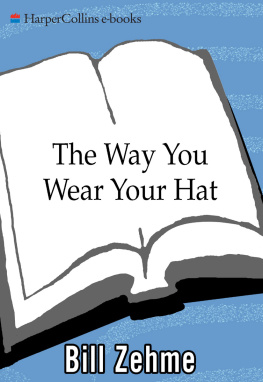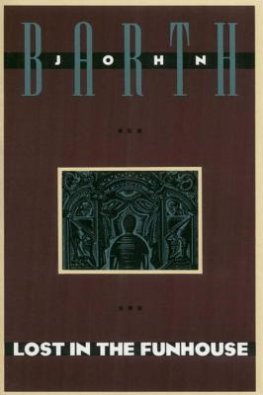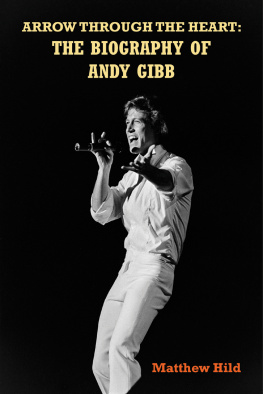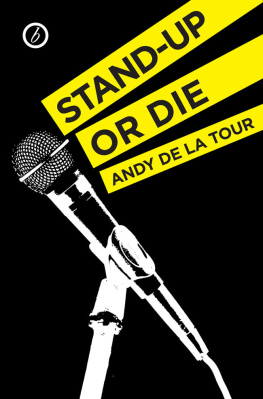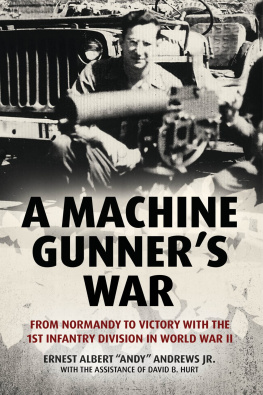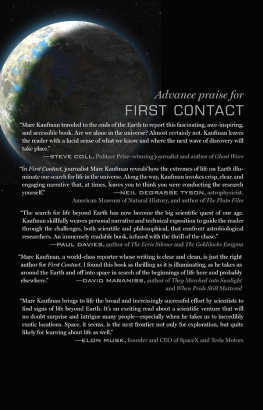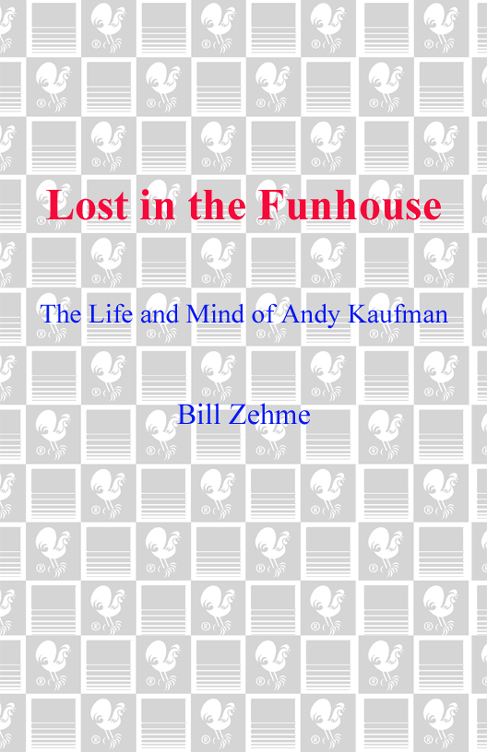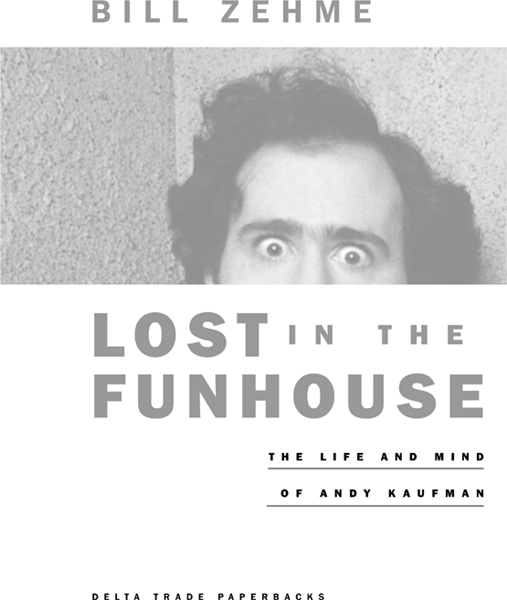LOST IN THE
FUNHOUSE
THE LIFE AND MIND OF ANDY KAUFMAN
Comprehensive if you want the facts, this is the
only [book] you need.
The New York Times Book Review
If I had lost the Andy Kaufman I first met in 1975, I found him again in Lost in the Funhouse.
Lorne Michaels, Saturday Night Live
Fascinating and frequently hilarious.
Kansas City Star
Insightful.
The Plain Dealer (Cleveland)
Nobody, not his family or his best friend, got as close to the truth about Andy as did Bill Zehme in Lost in the Funhouse. His six years of research unmasks the distortions and allows the reader to meet the real Andy.
Stanley L. Kaufman (Andys father)
Entertaining comprehensive [Zehme] interviewed more than 200 people who had known or worked with Kaufman; had full access to Kaufmans family as well as the comic performers personal papers; utilizes his managers diaries; and did some diligent reporting. Zehmes a pro.
Chicago Tribune
What a gift to have a book that helps you enjoy once again Andy Kaufmans wild and wondrous mind. Its brilliant!
Carl Reiner
Excellent.
Esquire (England)
Bill Zehmes bio of Andy Kaufman gets a firm grasp on the slippery master. Zehmes book hasnt a dull page.
Artforum
Bill Zehme was dedicated to revealing the true Andy Kaufman story and Im so grateful for that. This book is the interesting, funny, sad, unique and-finally and completely-true story of a very special life!
George Shapiro, Andy Kaufmans manager and co-executive producer of Man on the Moon
Ingenious the best possible guess of what this singular comedian was all about.
St. Petersburg Times
Zehme writes with a verve that is rare among biographers, sometimes letting the prose go into a voice reminiscent of Kaufmans own speech patterns.
Ft. Worth Star-Telegram
Everyone lives in his own fantasy world, but most people dont understand that. No one perceives the real world. Each person simply calls his private, personal fantasies the Truth.
Federico Fellini
Um. Ummm.
He came late. Mommy and Daddy tried to make him three times and each time they got a new baby started something bad happened to Mommy and she cried. He was made the fourth time, finally, and so was his invisible twin brother, Dhrupick, but nobody cared about Dhrupick, although Dhrupick would later help him do special things. No, really. He had to name Dhrupick himself, because nobody else ever saw Dhrupick, or they didnt know that they saw him even when they saw him. And also, since Dhrupick was his exact replicate, he could be Dhrupick when he wasnt himself, which was often, eventually more and more so. Anyway, Dhrupick made being somebody else easy, he learned. Of what was mathematically considered to be his childhood (just yearwise), he would later tell some person, Every once in a while, every week or two, I would wake up in the morning and I would say, I think Ill be Dhrupick. D-h-r-u, I think, p-i-c-k. I chose that name for a logical reason, but I forget what it was.
And so his eyes opened thirty-five years and four months before they stopped seeing anything anymore ever again. Once opened, they were stroboscopic! They were two very big bright blue dancers! They spun and spun inside white orbs even bigger! They said come-here-and-help-me-play-and-please-just-help-me-and-here-I-am-and-Im-not-here-at-all-and-oh-yes-I-am-no-really. He was seven pounds eleven ounces (a craps-table baby!) and Daddy later joked that his eyes had weighed four pounds alone. Daddy proudly designed his birth announcement with a picture of a baby rolling dice, come seven and eleven; pounds, ounces, natch. He (and Dhrupick) came out of Mommy just after two oclock on the afternoon of January 17, 1949, in a bed in Kew Gardens Hospital in Queens, New York. Mommy started calling him Pussycat almost right away. He purred for her most always, but he learned to yell sometimes, too. That came a bit later.
He got his own name from maternal favor: Mommy had a grandmother named Ann and an uncle named George, and so he became Andrew Geoffrey Kaufmanfirstborn child of a frustrated-dreamer second-generation costume jewelry salesman who would manage to do well for himself in a very tough racket and his pretty wife who was a former teen fashion model with piercing green eyes. He was adored most thoroughly, for he was also the first grandchild of both grandmas and both grandpas, each of whom bestowed assorted legacies of color and character and individuality upon the small pink boy. To them, he was delicious, this fine grandson whose cheeks they pinched, whose head they nestled, a sweet bubelah who could have anything he wanted, whom they indulged in ways he never knew he wanted but came to require when grown. It was the grandmas and the grandpas, more than anyone, who made him special, and for this he would love them and credit them always. Being special would be his singular excuse; not that he ever really tried to be that way or decided that specialness was his intention; he just was; and he was mostly glad about itno matter that Daddy often hollered at him, no matter that other kids called him crazy, no matter that everyone thought he was crazy. Everyone did think he was crazyeither a little or a lot. He was crazy. He was crazy like everyone never knew. But he knew just precisely how to be crazy. He knew everything he wanted to know.

Hello, this is George Shapiro. These are my personal notes to myself regarding Andy Kaufman. Today is Friday, September 1, 1978, and Im about to go over to see Andy as hes taping a new television series called Taxi for ABC-TV.
Ive been Andys personal manager for approximately two years. He came to my attention through my darling uncle and client, Carl Reiner, who saw Andy in a nightclub in New York called Catch a Rising Star, and Carl told me how unusual and different he was. Well, that may be one of the greatest understatements in the history of mankind. He is very close to being from another planet.
I am, for the most part, greatly enjoying working with Andy, because he has great creativity and spontaneity and its very interesting being around him. There are some very positive aspects of his nature and some very negative ones. One of the biggest shortcomings to his professionalism is his need to come late to every situation that he is in. Including being late to performances in major arenas such as Town Hall in New York. He was scheduled for an eight-thirty curtain, normal for Broadway, and he probably went on at five minutes to nine. Kept a very restless audience waiting. It was a sellout crowd and he opened his show as Tony Clifton, which is in Andys mind a secret, but many, many people in the industry and in the audience were aware that he was portraying another person, in makeup, in full makeup. He had a chin piece, a nose piece, his eyes were made up to be puffy, and he had a huge black wig covering his hair. His main line of patter, as you may know, is insulting the audience. He says, I dont have to be hereyoure lucky to have me! That nature of thing.


